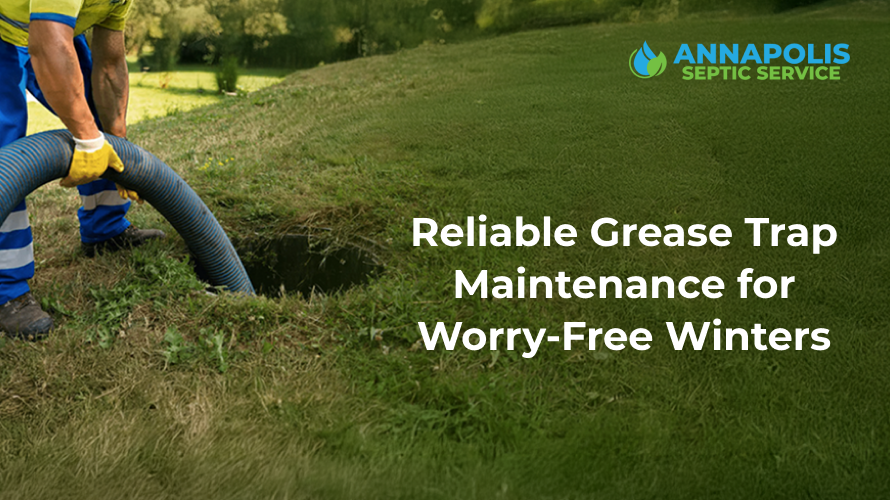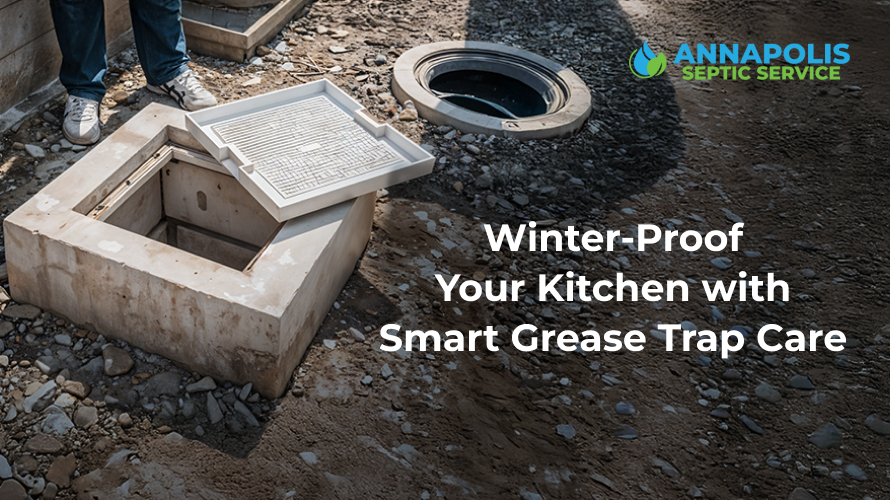Winter presents unique challenges for commercial kitchens. Cold temperatures can slow the natural breakdown of fats, oils, and grease in your system. Without proper attention, this can lead to blockages, unpleasant odors, and messy, costly problems at the worst time.
Preparing your grease traps for the season ensures smooth kitchen operations and avoids emergencies. Here’s a step-by-step guide to help your business stay ahead of winter challenges.
1. Schedule a Thorough Cleaning
Regular cleaning is the foundation of effective grease trap care. Even if you skim grease daily, a professional deep clean before winter ensures accumulated fats and oils are fully removed. Cold weather can cause grease to solidify more quickly, making it harder for your system to handle normal waste.
Using a grease trap maintenance service at least once a season can prevent backups and keep your kitchen running smoothly. Professionals can handle large accumulations safely and efficiently, saving you headaches in the long run.
2. Inspect for Damage or Leaks
Winter’s cold can worsen small cracks, corrosion, or leaks in your grease trap. Take time to inspect for loose fittings, worn seals, or visible damage. Early detection allows minor issues to be fixed before they escalate into major problems that could disrupt operations.
Routine inspections, paired with seasonal cleaning, extend the life of your system and protect your business from unexpected interruptions.
3. Manage Kitchen Waste Carefully
How you handle fats, oils, and grease in daily operations can greatly impact trap performance. Avoid dumping large quantities of grease at once, and consider collecting excess oil in containers for proper disposal.
Even small changes in handling practices can make winter maintenance easier, ensuring your system remains effective and reducing the frequency of emergency cleanups.
4. Monitor Performance and Flow
Changes in water temperature and usage during winter can affect flow through the trap. Watch for signs such as slow drainage, unusual odors, or puddles around the trap. These signals indicate that it’s time to pay attention before a blockage occurs.
Adjusting maintenance frequency based on system performance, rather than simply following a calendar, keeps your kitchen running efficiently.
5. Use Enzyme Treatments Wisely
Enzyme or bacterial treatments can help break down grease, but colder temperatures slow their activity. If you use these products, check the manufacturer’s instructions for winter adjustments and dosing. Proper use enhances your professional cleaning efforts, keeping grease traps operating smoothly even in cold conditions.
6. Leverage Technology for Maintenance
Modern equipment makes maintenance easier and more precise. Cameras, sensors, and specialized cleaning tools can detect hidden buildup or potential issues that might be missed during a visual inspection.
For additional insight, check out our blog post titled The Role of High-Tech Equipment in Grease Trap Cleaning. Understanding how advanced tools enhance cleaning efficiency can help you plan more effectively and maintain a healthier kitchen environment.
7. Plan a Seasonal Maintenance Schedule
Winter prep isn’t a single task; it’s an ongoing plan. Schedule regular inspections and professional cleanings based on your kitchen’s volume and usage. Staying ahead of seasonal challenges prevents costly emergencies and ensures continuous, reliable operation.
A thoughtful schedule balances professional services with daily kitchen habits, keeping your grease trap functioning optimally throughout the cold months.
8. Train Staff on Winter-Specific Care
Educating your team on the proper handling of grease and oils is crucial. Simple practices, like scraping grease from pots before washing and monitoring for early signs of trouble, reduce stress on the system. Staff awareness complements professional cleaning, making seasonal maintenance more effective.
Keep Your Kitchen Winter-Ready

Winter doesn’t have to be a time of worry for your commercial kitchen. Regular cleanings, careful handling of grease, and proactive monitoring ensure your system continues to work efficiently. Each small step contributes to smooth operations, reduced odors, and fewer emergencies.
At Annapolis Septic Service, we offer professional commercial grease trap maintenance services designed to prepare your kitchen for winter. Our team ensures that your traps are clean, functional, and efficient, allowing your business to focus on serving customers without interruption. Contact us today to learn how we can help keep your kitchen running smoothly this winter.
FAQs
1. How often should a commercial grease trap be cleaned?
Cleaning frequency depends on the size of your kitchen, the volume of grease produced, and local regulations. Generally, a thorough cleaning is recommended at least once a season, with additional inspections as needed. Seasonal cleanings before winter help prevent solidified grease and potential backups.
2. What are the signs that my grease trap needs attention?
Look for slow drains, unpleasant odors, or pooling water around the trap. These are clear indications that grease is building up and maintenance is required. Prompt attention prevents blockages, operational interruptions, and costly emergency cleanups.
3. Can staff help maintain the grease trap between professional cleanings?
Absolutely. Simple actions, such as scraping excess grease from pots and pans, properly disposing of oils, and reporting unusual odors or slow drainage, can significantly reduce the load on your grease trap. Staff awareness complements professional maintenance efforts.
4. Are enzyme treatments effective in winter?
Enzyme treatments can aid in breaking down grease, but cold temperatures slow bacterial activity. Adjusting usage according to product guidelines can enhance efficiency, but these treatments are most effective when combined with professional seasonal cleaning.
5. Why is pre-winter maintenance important for commercial kitchens?
Winter can cause grease to solidify more quickly, increasing the risk of clogs and backups. Pre-winter maintenance ensures your system runs smoothly, prevents odors, and avoids costly emergency service during the coldest months.

